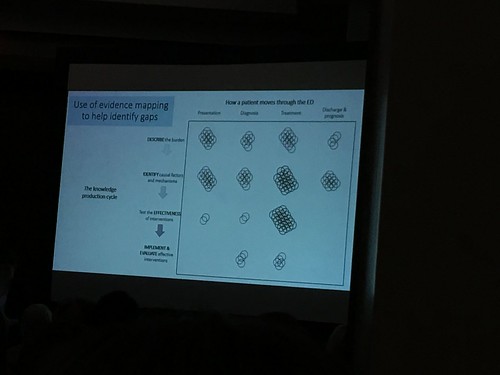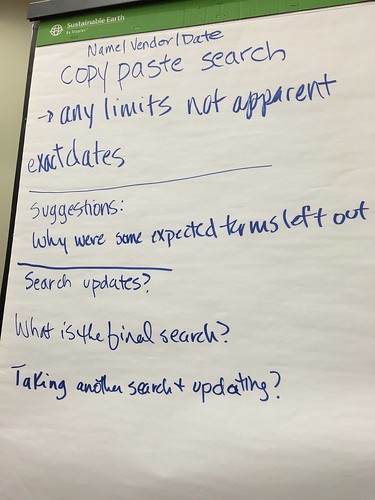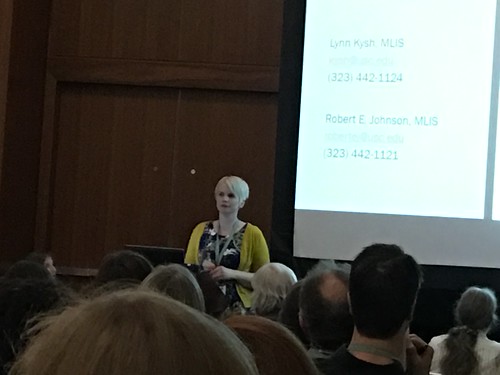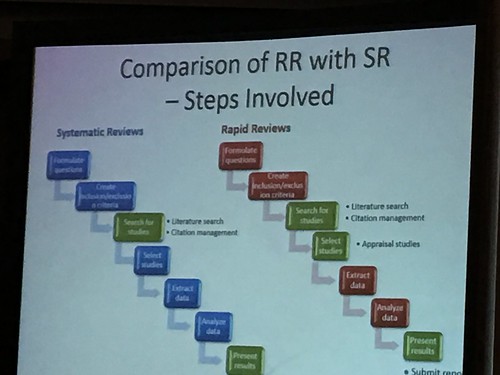Wow, wow, wow! What an AMAZING day! I'm at the Medical Library Association Annual Meeting, and trying to get to as many of the systematic review events as I can. Today is the first full day of the conference, and it was a jackpot — PRISMA for searches, a session on EBM/EBHC training, and a session on systematic review services. Lots of posters, too, but I haven't had a chance to go look at those yet. I tweeted a screenshot of the special session on systematic reviews this afternoon. (Click through for the full effect of the tweet.)
Excited about the systematic review sessions! #mlanet16 pic.twitter.com/F5pLOVsebC
— P. F. Anderson (@pfanderson) May 15, 2016
Dean Giustini asked me what's new, so let me get right to that.
@pfanderson Hi Patricia anything new to share? #sharingiscaring #mla2016 #mlanet16
— Dean Giustini (@giustini) May 15, 2016
PRISMA
I saw an event in the program, something about PRISMA standards, so I thought I'd poke my head in. When I poked my head back out later, I could not stop talking about it. The gist of it is that PRISMA, whom most medical librarians and journal editors know of as providing standards and guidelines for how systematic review data should be reported, are branching out. Me, I've been watching with excitement the various PRISMA extensions that have been being added recently. Thsee include standards for reporting protocols, meta-analyses, patient data, abstracts, and more. Well, it turns out there is a pretty substantial team working on developing PRISMA guidelines for reporting search strategies. This is pretty exciting for me! And somehow, I had missed it until today. The group today was opening the results from the original team to a broader audience and asking for reactions. They had come up with 123 guidelines, which they narrowed down to 53, and then we broke into four subgroups (search strategy, grey literature, documenting results, database characteristics) brainstorming about how to narrow down even further, into truly actionable points. I tell you, this is a group to watch. Some of my favorite lines: "I did this review according to PRISMA standards." "You can't. PRISMA is a 'reporting' standard, not a 'doing.'" (Margaret Foster) "The faculty are asking individual students to do something that is essentially a team sport." (Ana Patricia Ayala) "Cochrane says, 'You will not limit by language.' PRISMA says, 'You will report any limits.'" (Margaret Sampson) Here is just one of the flip boards from the conversation to whet the appetite of the systematic review methods nerds.
SYSTEMATIC REVIEW SERVICES
Later in the day, there was a complete session devoted to systematic review services in medical libraries. Yes, this is the same one from the tweet earlier in this post. I was dashing in late from the poster session, so I missed the beginning of the presentation on training needs by Catherine Boden and Hellsten. I was disappointed, because they were citing many wonderful articles I wanted to look into later. I'm sure glad the slides are in the online MLA system, because I'll have to go find them! Being late also means I didn't get any photos from their talk. The most provocative concept I pulled from their talk was the idea that systematic reviews are actually "a constellation of related methods rather than a single methodology." So elegantly put, and so true. It's a helpful way to reframe how we think about what we do, and is supported by the same drive that is motivating the various PRISMA extensions mentioned above. 
Sarah Vistinini presented for her team on scoping reviews, their similarities to and differences from systematic reviews, and the value of being included in the ENTIRE process (which she cleverly described as giving a "better appreciation of all the moving parts."). Sarah showed some very cool evidence mapping (see pic above), dot prioritization, and more. There were glowing recommendations of the 2005 Arksey and O'Malley article on scoping review methodologies and a wonderful link to all the references: bit.ly/visin-2016. Kate Krause presented for a team primarily from the Texas Medical Center Library about their efforts to launch a new systematic review service, and the resulting "opportunities" (wink, wink, nudge, nudge, we all know what THAT means). The moderator described their presentation as a "collective therapy session," which generated considerable amusement among the audience. The most important parts of her talk were, of course, the solutions! They require systematic review requests to come through an online request form, which gives them solid statistics and allows them to manage workflow better. They are using a memorandum of understanding (MOU) with faculty to facilitate a discussion of the duties, timeline, and expectations. They are providing different levels of service, with some interesting requirements for the highest level of service (like, if I understood correctly, mandatory five face-to-face meetings with the project lead). One curious nugget for which they are seeking the citation was heard at a prior MLA meeting — the more face-to-face meetings you have with a systematic review researcher, the more likely they are to actually publish on the project. They have a wonderful-sounding information packet given to new SR researchers, but I didn't catch everything in it. I did catch bits (Cochrane timeline? list of other review types?) that make me want to know more!
Lynn Kysh and Robert E. Johnson presented a talk with the awesome title: "Blinded Ambition, misperceptions & misconceptions of systematic reviews." They discussed some of the challenges to co-authorship and publication being assumed as an automatic good for librarians working on systematic review teams. Lynn described constraints to completing publication, and described times when librarians there removed their name from articles being submitted for publication because of methodological concerns. Very very interesting content. Well, and then there were the forest plot kittenz.
OMG this slide from Lynn Kysh's presentation #catz #mlanet16 pic.twitter.com/HSFh1FuB7F
— Sarah V (@SVisin) May 15, 2016
Last but not least, Maylene Kefeng Qiu represented a team that did the bulk of the work for a rapid review in ... three weeks. Intense! Much of the challenge centered around timing, expertise available, staffing, workflow, and management coordination. The librarians on this team actually did the critical appraisal of the articles before giving the final dataset to the faculty member writing the review. My favorite line from her talk was, "Stick to your inclusion/exclusion criteria." Their slide deck had so many wonderful images illustrating parallels and differences between systematic reviews and rapid reviews. I hope it's ok if I share just one.






